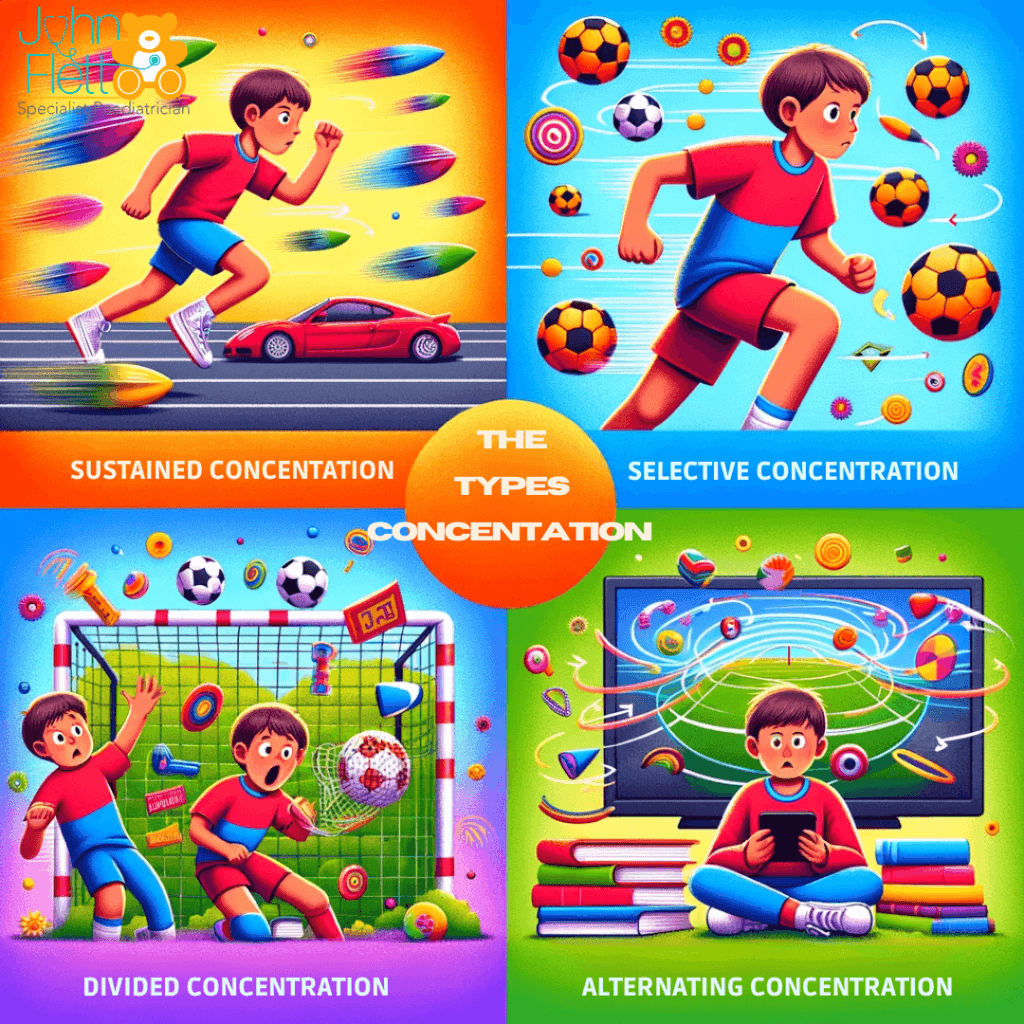Understanding and Enhancing Concentration in Children with ADHD: Practical Strategies for Parents

Attention Deficit Hyperactivity Disorder (ADHD) presents unique challenges in children, particularly in the realm of concentration. By understanding the different types of concentration and implementing specific strategies, parents can significantly help their children. Moreover, the role of medication in managing ADHD and aiding concentration is vital. This article aims to provide practical insights for parents to understand and support their children’s concentration needs.
The Four Types of Concentration in ADHD
1. Sustained Concentration: Children with ADHD often struggle with maintaining attention over extended periods. They might start tasks with enthusiasm but get easily distracted.
*Practical Strategy:* Create a structured environment with minimal distractions. Use timers to break tasks into manageable segments, allowing short breaks in between.
2. Selective Concentration: These children may find it difficult to filter out irrelevant stimuli, affecting their ability to concentrate on a single task.
*Practical Strategy:* Teach your child to identify and consciously ignore distractions. Noise-cancelling headphones or a quiet, designated study area can be beneficial.
3. Divided Concentration: ADHD can make multitasking overwhelming. Children might jump from task to task without completing any.
*Practical Strategy:* Encourage focus on one task at a time. Visual aids like lists or planners can help them organise and prioritise tasks.
4. Alternating Concentration: Rapidly shifting attention from one activity to another can be common, leading to incomplete tasks.
*Practical Strategy:* Use visual cues to signal a change in activities and transition slowly. Establish a predictable routine to help manage these shifts better.
The Role of Medication in Enhancing Concentration
Medication is often a crucial component in the treatment of ADHD. It can help improve focus, attention span, and impulsivity, thereby enhancing a child’s ability to concentrate. Stimulants like methylphenidate and amphetamines are commonly prescribed and can be remarkably effective.
Key Points for Parents:
– Consult a specialist: Before starting any medication, it’s essential to consult a paediatrician or a child psychiatrist.
– Regular monitoring: Medication effects vary, and regular monitoring is necessary to find the right dosage and type.
– Understand the medication: Educate yourself about the benefits and potential side effects of ADHD medications.
– Combine with behavioural strategies: Medication is most effective when combined with behavioural interventions and environmental modifications.
Implementing Concentration Strategies
1. Routine and Structure: Establish a consistent daily routine. Predictability can significantly reduce anxiety and enhance focus.
2. Positive Reinforcement: Use rewards and positive reinforcement to encourage your child when they successfully concentrate or complete a task.
3. Physical Activity: Regular physical exercise can improve concentration and reduce symptoms of ADHD.
4. Mindfulness and Relaxation Techniques: Teach your child mindfulness exercises. Techniques like deep breathing or guided imagery can enhance focus.
5. Diet and Nutrition: A balanced diet, potentially supplemented with omega-3 fatty acids, can have a positive effect on concentration levels.
6. Sleep Hygiene: Ensure your child gets adequate sleep. Poor sleep can exacerbate concentration problems.
7. Technology Breaks: Limit screen time, as excessive use of gadgets can impact attention spans.
8. Involve Teachers: Work with your child’s teachers to implement strategies that can be used in the classroom.
Conclusion
Understanding the nuances of concentration in children with ADHD and applying tailored strategies can make a significant difference. While medication is an essential aspect of treatment, combining it with practical behavioural strategies can lead to better outcomes. Remember, every child is unique, and what works for one may not work for another. Patience, persistence, and consistent support are key to helping your child navigate the challenges of ADHD.

Responses